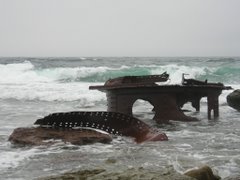 The talk among Nova Scotia Atlantic Salmon anglers this fall has been all about the weather. September and October have been unusually warm. While the balmy days make comfortable conditions for anglers, some are saying they would rather brave the cold.
The talk among Nova Scotia Atlantic Salmon anglers this fall has been all about the weather. September and October have been unusually warm. While the balmy days make comfortable conditions for anglers, some are saying they would rather brave the cold.
On Nova Scotia's Margaree River, Thanksgiving weekend anglers were saying that the fall run had not arrived this season. No one I talked to had seen a bright fish. Salmon that were sighted in the pools were all "black fish" - some had been there all summer, according to local anglers.
On the Wallace this weekend, there was no sign of the fall run. I talked with a woman who had tagged a grilse, and I actually saw the fish - scrawny and black. I also heard an eyewitness report of a large salmon being released, another dark fish.
I spoke with my friend, Norm Fortune, yesterday. Norm is a fixture on the River Philip, a local angler with years of experience. In his words,
"I thought the last two years were bad, but this year is terrible. I haven't seen a bright fish yet. Every year they come later and later. The season will be over before the fish come."Norm is one of a growing number of anglers who believe that climate change is influencing Atlantic Salmon migratory behavior. He would like to see the salmon fishing season changed from its current (September 1 - October 31) dates, to a new schedule (September 15 - November 15), one that reflects what anglers are recognizing as a new pattern of migratory behavior - late returns of fall run Atlantic Salmon.
The water temperature yesterday on the Wallace was 55 degrees F. I checked my fishing log: Ten years ago, on October 25, 1997, the water temperature was 35 degrees F and the pools were full of fish. On that day, in a two hour period, I watched 69 salmon and grilse leap into the crisp autumn air - each one bright as a silver dollar!
Twenty degrees Fahrenheit is a significant temperature differential. I don't know what signal tells a fall run salmon when to enter a river, but if water temperature has anything to do with it, the local anglers may be on to something.
Photo by Dave Dobson: Town Pool, River Philip.












